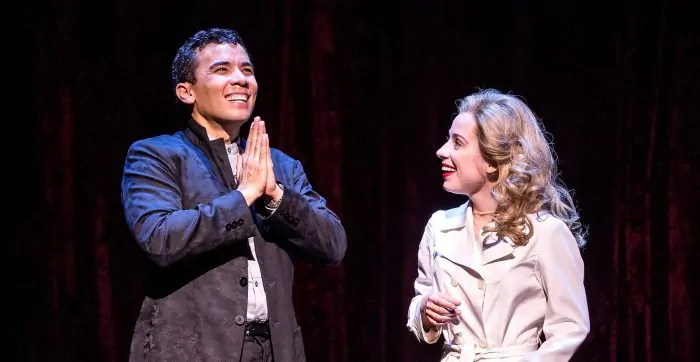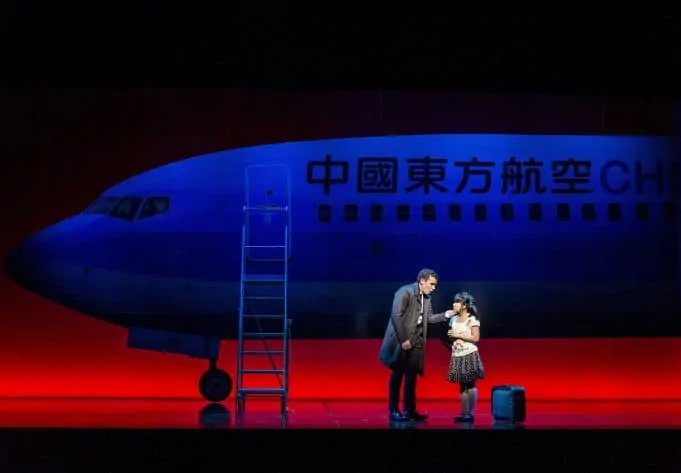On November 29, 2015, the “most famous American Chinese playwright” was stabbed in the neck. That’s David Henry Hwang the real, award-winning playwright, and also David Henry Hwang the character in his own play Soft Power (currently at the SF Curran), and also David Henry Hwang the character in the musical Soft Power hallucinated by the character in the play. (It’s all very meta.)
The “fever dream” musical in Hwang’s vision, imagined as a sort of race-switched The King and I, is a romp through musical theater history. The choreography, staging, lyrics, and melodies nod to the pantheon of classics, including everything from Oklahoma! and Finian’s Rainbow to Xanadu and Les Mis. (That’s nowhere near a complete list; musical theater buffs will enjoy playing spot-the-reference.) At the musical’s intermission, a panel of experts convenes for discussion. The Chinese panelists praise Soft Power for inventing a new genre of entertainment, while an American panelist weakly protests that its form is appropriated from American musicals.
The panelists also insist that the America portrayed in the musical is artistic but nonetheless true. In a reversal of the Orientalist American-in-fantasy-Asia trope, this is an (Occidentalist?) Asian in fantasy America. Our hero, Xue Xing, arrives at Hollywood International Airport by way of the Statue of Liberty, and goes out walking on the Golden Gate Bridge. The men he meets in this dangerous country all tote guns; the women want to leave (for China, naturally). When he encounters Hillary Clinton on the campaign trail, she is young and pretty with long, blond hair – the only possible look for the love interest in a musical set in America!
In true The King and I fashion, Xue Xing must offer America’s government the chance to prove they are not barbarians. After Hillary loses the election (the winner is never mentioned by name), America declares war on China. Xue Xing swoops into the White House and persuades the swaggering politicians to lay down their guns. It’s absurdly easy, but that’s the point. Contact with whiteness is a “civilizing” force in The King and I, so why shouldn’t exposure to China’s “superior” ways be inherently convincing to violent, misguided Americans?
Jeanine Tesori’s score, luxuriously orchestrated for a twenty-two-piece orchestra, dabbles in a variety of musical genres. The numbers are tuneful with moments of great harmonic beauty, without being particularly memorable. The talented cast produced clear choral blends and edgy pop-rock belts equally well. Appropriately, Hillary Clinton (Alyse Alan Louis) had to work the hardest, with a madcap multi-style dance marathon in the first act (where she tried to woo voters) and a show-stopping rock song in the second (where she defended democracy). Conrad Ricamora sang Xue Xing’s bland ballads with great sweetness. Francis Jue made David Henry Hwang a self-deprecating, smart, relatable character, shaky singing voice notwithstanding. Jon Hoche had a brief but fabulous star turn as the Chief Justice, explaining the American electoral system with a song and dance.

This “play with a musical” is fun, but far from flawless. The frame story is heavy-handed: the points about Orientalism and appropriation would be clear with less explicit discussion of them in the pre-musical dialogue. The musical itself presents an amusing, alienated image of America, but does not challenge the audience’s worldview. The criticisms highlighted by the “Chinese point of view” are standard progressive complaints: an unfair electoral system, lax gun laws, lack of universal healthcare, and uneducated voters. If this is supposed to be what appropriation and misrepresentation feels like, it’s oddly comfortable.



